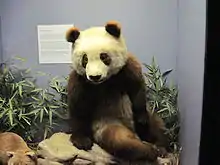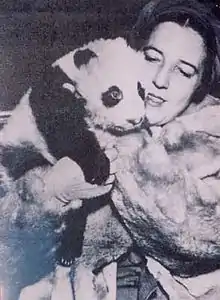
Su Lin (Chinese: 蘇琳; pinyin: Sūlín) was the name given to the giant panda cub captured in 1936 and brought to America by Ruth Harkness.
History

Harkness mentioned in her 1938 book The Baby Giant Panda that the capture took place within a day's walk from the Min River in Sichuan.[2] Su Lin, about 9 weeks old at the time of his capture,[3] was named after Su-Lin Young, the sister-in-law of Harkness's Chinese-American expedition partner Quentin Young. Harkness translated Su Lin as meaning "a little bit of something very cute".[1] (Harkness and Young were unaware that the baby panda was, in fact, a male.)[4]
Harkness returned to America with the bottle-fed cub, and Su Lin became the first live panda to be displayed in the United States. In April 1937, the panda was purchased by Brookfield Zoo outside of Chicago, where he was visited by such celebrities as Shirley Temple, Kermit Roosevelt, and Helen Hayes. Harkness brought a second panda, Mei-Mei, to be a companion for Su Lin at the zoo in February 1938. However, the two animals fought with each other, and were soon separated. Su Lin died of pneumonia only a few weeks after Mei-Mei's arrival.[5] He was replaced by Mei-Lan the following year.[6]
References
- 1 2 SPatricia Sullivan. "Adelaide 'Su-Lin' Young, 96, Explorer and Panda Namesake Archived 2012-10-08 at the Wayback Machine". The Washington Post. May 22, 2008. Retrieved on November 17, 2009.
- ↑ Harkness, Ruth. The Baby Giant Panda, 1938. New York: Carrick & Evans. p.36.
- ↑ Vicki Constantine Croke. The Lady and the Panda. Random House, 2006. 129.
- ↑ "Animals: He or She?" Time. May 1, 1939. Retrieved on November 17, 2009.
- ↑ Andrea Frederici Ross. Let the Lions Roar. Chicago Zoological Society. 1997. 64-67.
- ↑ Time Inc (30 June 1941). "Panda Love: Mei-Mei Courts Her Beau and Gets Nowhere at All". LIFE. Vol. 10, no. 26. Time Inc. pp. 55–56. ISSN 0024-3019. Retrieved 9 June 2011.